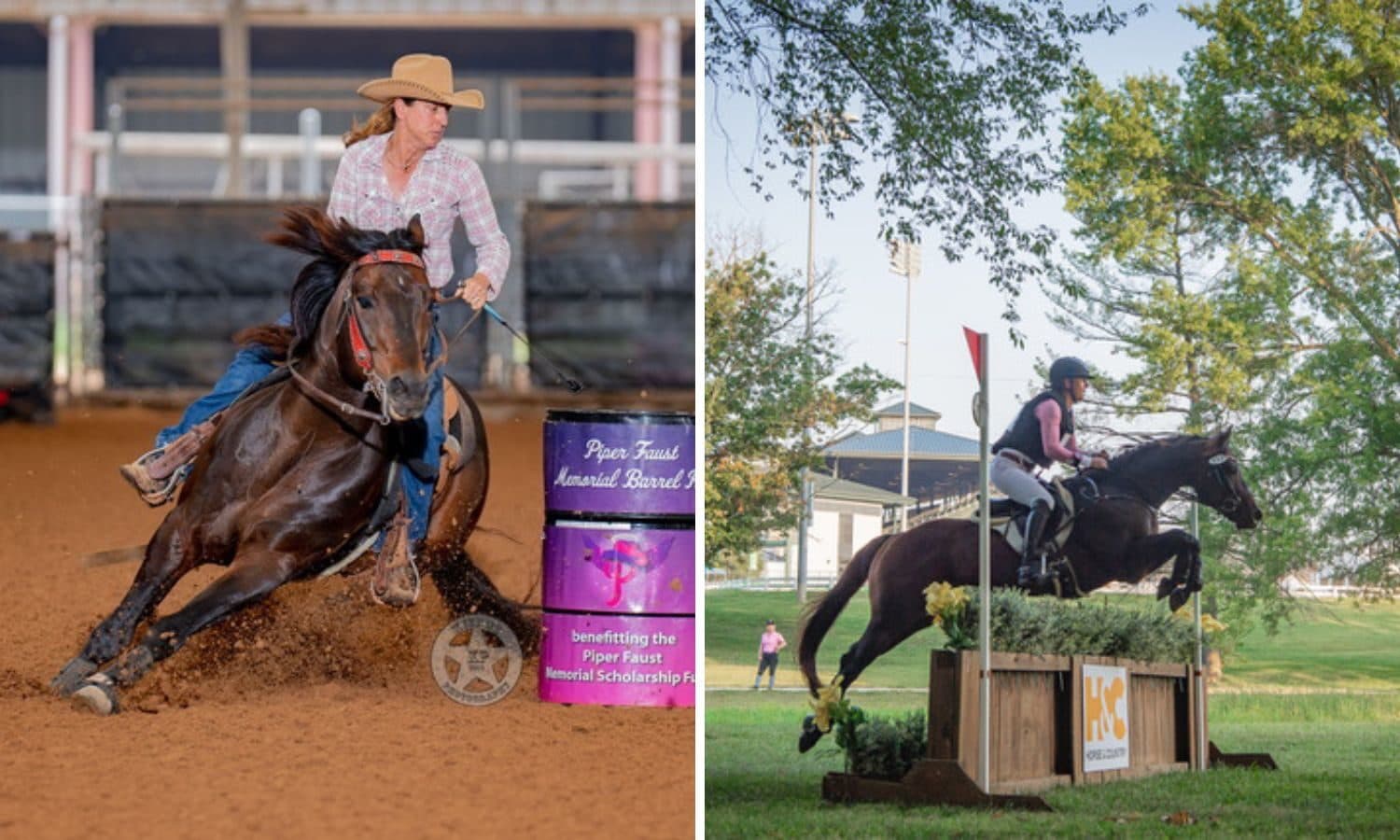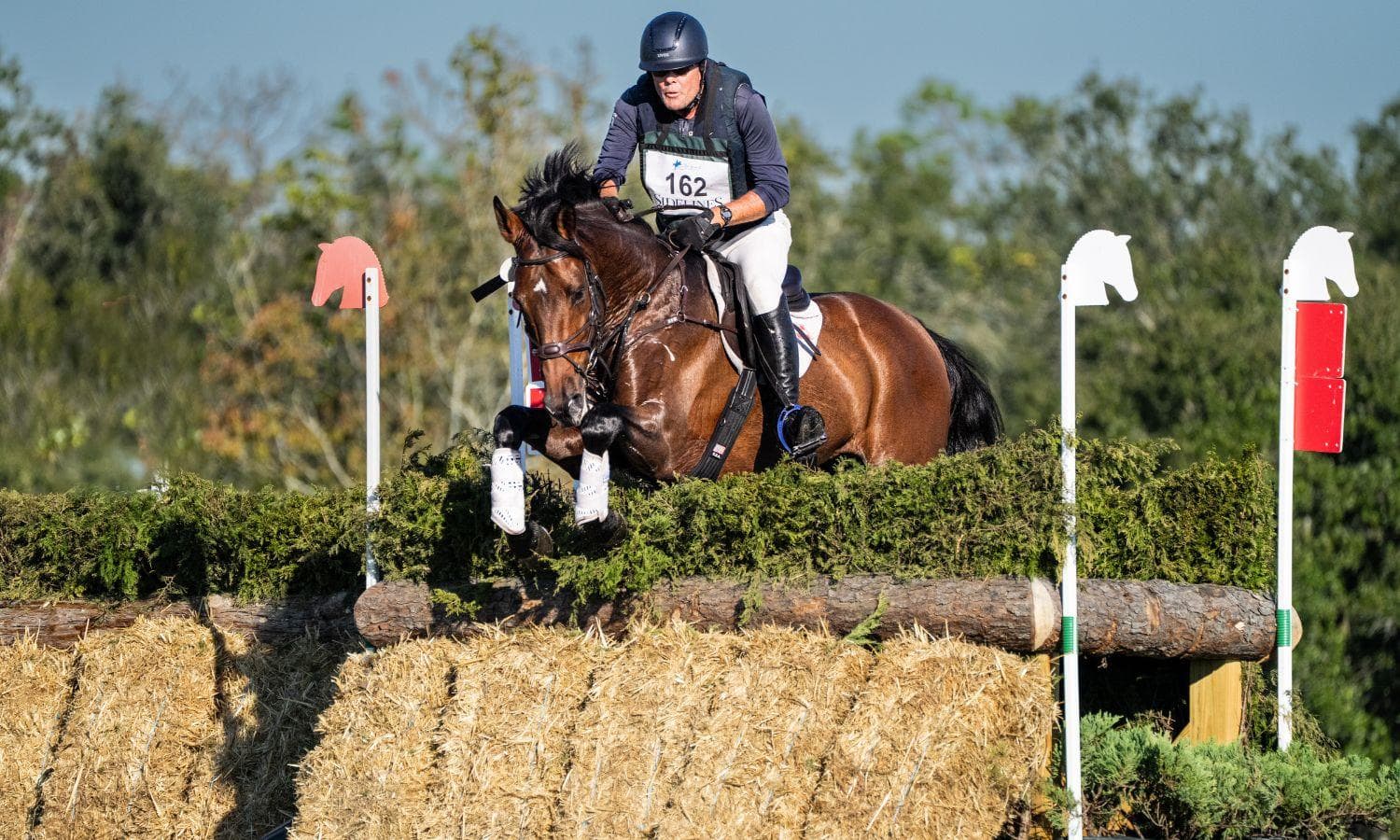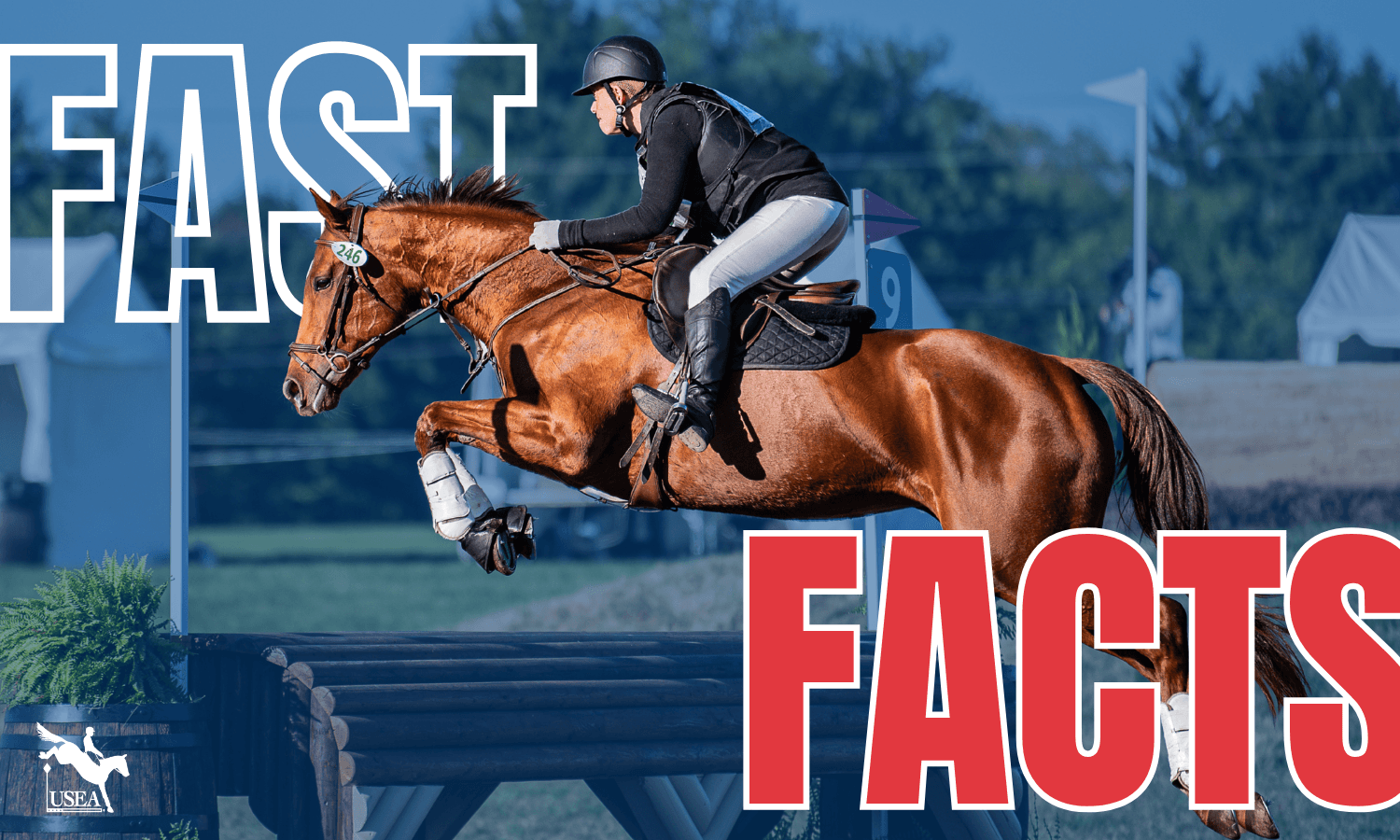Jennifer Skinner Forges a Unique Partnership with her Quarter Horse Stallion Bullys Legacy

There were so many horses and riders who overcame the odds and triumphed at this year's USEA American Eventing Championships presented by Nutrena Feeds. While we couldn't tell every story during the event, we'll be sharing some in the coming weeks on useventing.com.
“Wow, I wasn’t expecting that. He is quite the athlete!” Such comments are fairly common for Jennifer Skinner to hear about her American Quarter Horse stallion Bullys Legacy (“Diggy”). Eleven years ago Skinner, a professional barrel racing and young horse trainer in Bryan, Texas, welcomed the bay colt into the world—he’d been the culmination of dream bloodlines, bred for a career in her industry. After success in the rodeo world, friends encouraged Skinner to introduce Diggy to eventing, because of his trainability and athleticism. And so, in her late 30s and after having her fourth child, Skinner and her little stallion added another discipline to their skillset and stepped into the eventing community.
The journey began 13 years ago when Skinner’s husband, Ryan Skinner, gifted her an early Christmas present—a fully paid stud fee to breed her broodmare to one of the top barrel racing stallions, Frenchman’s Guy. Getting the mare in foal wasn’t easy, and it was two more years before Diggy was born. “I was instantly in love and knew my heart and soul was committed to him,” remembered Jennifer.
During his early years, Diggy was directed towards the barrel arena like he was bred to do. His 4-year-old futurity year was met with a little blessed, yet unfortunate, timing. “I was pregnant with my second child,” said Jennifer. “But he took solid care of me, packing me to a handful of barrel racing futurities and even made a powerful showing competing at the [championships for young horses] with only seven runs under his belt.”
Looking to amp up her own horsemanship knowledge, she began taking dressage lessons on Diggy, using the skills they learned to improve their barrel racing and work on slower-paced events. “He was loved in dressage for his trainability and incredible temperament, impressing the clinicians with his natural balance and work ethic even as a young stallion,” she recalled. Two years later, Diggy was sidelined with EPM, but after rehab and dedication, the pair used their dressage training to slowly rebuild his balance and coordination, and he returned with resilience and continued towards their rodeo path.
Jennifer had clients and friends who competed in eventing and often commented on how he probably had the ability to jump well. Since she loves an all-around athlete and to show a horse’s adeptness in multiple arenas, eventing appealed to her. Plus, it was a chance for Diggy (whom she lovingly calls “a freak of nature”) to show off his talents. “What makes him so versatile is his huge heart that knows no quit—he will always say yes to anything asked of him and he fears nothing,” said Jennifer. “When Diggy was a youngster, a dressage trainer told me, ‘I have never seen a more willing creature. Someone could make this horse’s life a living nightmare because he will never say no.’ I took that very seriously and always listen to Diggy intently as we train, since I know he will put in all his effort and try no matter how he feels,” she said.
With Diggy on board for their new discipline, it was up to Jennifer to do her part. After decades of Western riding that required “sitting down and back” to balance for a stop or turn around barrels, teaching herself to close her hip angle and get up and out of the saddle over a jump was a sharp learning curve. Additionally, learning to build a connection in dressage was a new concept for them both, though she admits that the stallion was a “patient saint” as she worked to catch up to his abilities.
As Jennifer became more adept with English riding, she discovered how it fine-tuned her attention to detail and comprehension of the physiology of the horse and rider together. “Balance and physics don’t change with what saddle is being worn, so really paying attention to how to make athletic maneuvers easier by being more rhythmic and balanced has enriched my understanding for my horsemanship and increased my ability for smoother circles, bigger stops and quicker turns in the Western arenas,” she said.
Equally important, her Western background forged the relationship she has with her horses, an all-important aspect of eventing. “Western disciples value a respectful partnership with an ability to really ‘let go’ of a horse so they can do their job, using light and subtle cues with often little to no rein contact,” she explained. “This brings a new level of understanding to riding off one’s seat and leg. English riders who come to me for Western lessons are often blown away when I make them drape the reins loosely and ride with one hand and really focus on their body balance and synchronization with the horse.”
As far as the buzzy atmosphere of events is concerned, Jennifer never had any doubts about her stallion’s reactions, thanks to his early start in the rodeo world. From a young age, Diggy grew accustomed to backfiring clown cars, fireworks, and brightly lit fair rides nearby. Jennifer recalled warming up in the dark in grass parking lots, among trucks and trailers, and galloping Diggy into a noisy, crowded arena. “We expect the trust we built to carry us through the performance,” she said. “One time Diggy and I had to wait our turn in the dark, in a holding pen amongst other competitors with their horses and the mutton busting sheep! He made not a sound and waited patiently to do what we were trained for.”
Once they were fit and ready, the pair entered a schooling event in June of 2023 at Meadow Creek Horse Park (Kosse, Texas) at the Beginner Novice level. They had schooled cross-country with a few trainers, but had never completed a whole course. Not only did Diggy complete his first full horse trial, but he showed everyone his versatility by winning it on his dressage score of 31.0.
Afterwards, Jennifer learned more about recognized shows and set her sights on getting to the USEA American Eventing Championships presented by Nutrena Feeds (Lexington, Kentucky). This past spring they moved up to Novice and successfully qualified with solid finishes, including a second at Pine Hill Spring Horse Trials in Texas. “He eats up cross country—he is bold and game and loves a good long gallop,” said Jennifer. “His 15.2-hand stature can be deceiving as he will often match stride length with horses one and two hands hands taller. He is quick footed and agile, and even though he is bred for sprinting, he gallops over a cross-country course with ease; making the time has never been a challenge for him.”
In August, Skinner and Diggy journeyed to Kentucky to compete against the country’s best in the AEC’s Novice Rider division. The pair scored a 30.0 in dressage and were placed well as they headed into cross-country. “He was lovely, responsive, bold, made big, smooth, easy, strides and jumped big,” she recalled, “but unfortunately we had a rider error.”
Before the event, Skinner had never worn a watch during her cross-country rounds, having learned to practice pacing without it. After finding out she was in a three-way tie, friends advised her to wear one during her round, so her time would be more precise. “I kept hearing from more experienced eventers that Kentucky was a hard course and flatland horses would struggle making time,” she recalled. “I was told to cut some straighter paths when often I would have taken my big strided, fast horse on longer routes, knowing his natural pace is often too fast for Novice. I made a crucial mistake and memorized minute markers wrong and thought we were on pace even though it felt quick.”
As they neared the finish line, she realized what had happened. “There wasn’t enough time to undo what had been done, no matter how slow I went at that point, and we crossed 8 seconds too fast earning us 3 penalty points and costing us a top-10 placing. I underestimated how fit we were and how quick he can be even with the rolling hills of Kentucky!”
Undeterred by her mistake, and determined to finish the weekend strong, Jennifer stayed focused as she entered the Rolex stadium for their show jumping round. “Knowing we missed the chance at top 15, we unleashed the barrel racers in us, and I just sought to have a show jump round that was worthy of such an arena,” she said. “We made the tight turns and close corners, and tried to take as quick a path as possible while staying clean and balanced, just for the challenge of it.” A double-clear round left them with a 23rd placing in their division. “As he tends to be, in my eyes he was flawless,” she added.
Jennifer’s children are also horse lovers—some enjoy roping cattle, as their father Ryan did before he transitioned to becoming a farrier, while her son, Asher, is one of her biggest cheerleaders and takes his videoing responsibilities at shows very seriously. Her daughter, Rylinn, loves eventing, but her youngest child Jaedyn was the only family member who could join Jennifer at the AEC, a dream trip for the 4-year-old who loves galloping on her miniature horse Buttercup. “Ryan had to hold down the fort at home, but they all watched the live stream, FaceTimed me, and had big ‘welcome home’ and ‘congratulations’ signs ready when I got back,” she said.
Her friend Kate Brown, a longtime eventer, came along for support, and on the drive home the women began planning next year’s trip. Brown competes Diggy’s son, Heza Lil Ruff Bully (“Taz”), at the Novice level as well, and has her sights set on competing in next year’s AEC at Galway Downs in California.
Though their days in the rodeo world aren’t finished, Jennifer and her little stallion are focusing on eventing for now. “We are moving up to Training level this year, and the thought of showing the two boys alongside one another, with a chance at them both qualifying, sounds like a dream come true,” she said. “Raising competitive, fun, willing, athletic, and successful horses has been a goal for most of my life. Seeing that come to fruition is just incredible.”















